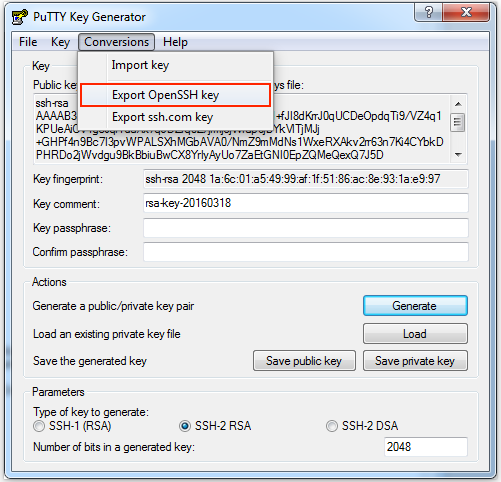Generate Rsa Key With Passphrase Openssl
genpkey - generate a private key
- Generate an RSA private key using default parameters: openssl genpkey -algorithm RSA -out key.pem. Encrypt output private key using 128 bit AES and the passphrase 'hello': openssl genpkey -algorithm RSA -out key.pem -aes-128-cbc -pass pass:hello. Generate a 2048 bit RSA key using 3 as the public exponent.
- SUMMARY Allow a user to specify the privatekey passphrase when dealing with openssl modules. ISSUE TYPE Feature Pull Request COMPONENT NAME opensslprivatekey opensslpublickey opensslcsr ANSI.
opensslgenpkey[-out filename][-outform PEM DER][-pass arg][-cipher][-engine id][-paramfile file][-algorithm alg][-pkeyopt opt:value][-genparam][-text]
If an SSH key pair with the same name exists in the given location, those files are overwritten. The following command creates an SSH key pair using RSA encryption and a bit length of 4096: ssh-keygen -m PEM -t rsa -b 4096 If you use the Azure CLI to create your VM with the az vm create command, you can optionally generate SSH public. Host. AddKeysToAgent yes UseKeychain yes IdentityFile /.ssh/idrsa; Add your SSH private key to the ssh-agent and store your passphrase in the keychain. If you created your key with a different name, or if you are adding an existing key that has a different name, replace idrsa in the command with the name of your private key file. Create a user in IAM for the person or system who will be calling the API, and put that user in at least one IAM group with any desired permissions. See Adding Users. You can skip this if the user exists already. Get these items: RSA key pair in PEM format (minimum 2048 bits). See How to Generate an API Signing Key. Fingerprint of the public key. # openssl genrsa -out www.example.com.key 4096 To create a new password protected Private Key (Remember the passphrase) # openssl genrsa -des3 -out www.example.com.key.password 4096 To remove the passphrase from the password protected Private Key # openssl rsa -in www.example.com.key.password-out www.example.com.key. Yes, it is possible to deterministically generate public/private RSA key pairs from passphrases. For even passable security, the passphrase must be processed by a key-stretching function, such as Scrypt (or the better known but less recommendable PBKDF2), and salt (at least, user id) must enter the key-stretching function; the output can then be used as the seed material for the RSA key.
The genpkey command generates a private key.
the output filename. If this argument is not specified then standard output isused.
This specifies the output format DER or PEM.
the output file password source. For more information about the format of argsee the PASS PHRASE ARGUMENTS section in openssl.
This option encrypts the private key with the supplied cipher. Any algorithmname accepted by EVP_get_cipherbyname() is acceptable such as des3.
specifying an engine (by its unique id string) will cause genpkeyto attempt to obtain a functional reference to the specified engine,thus initialising it if needed. The engine will then be set as the defaultfor all available algorithms. If used this option should precede all otheroptions.
public key algorithm to use such as RSA, DSA or DH. If used this option mustprecede any -pkeyopt options. The options -paramfile and -algorithmare mutually exclusive.
set the public key algorithm option opt to value. The precise set ofoptions supported depends on the public key algorithm used and itsimplementation. See KEY GENERATION OPTIONS below for more details.
generate a set of parameters instead of a private key. If used this option mustprecede and -algorithm, -paramfile or -pkeyopt options.
Some public key algorithms generate a private key based on a set of parameters.They can be supplied using this option. If this option is used the public keyalgorithm used is determined by the parameters. If used this option mustprecede and -pkeyopt options. The options -paramfile and -algorithmare mutually exclusive.
Print an (unencrypted) text representation of private and public keys andparameters along with the PEM or DER structure.
The options supported by each algorith and indeed each implementation of analgorithm can vary. The options for the OpenSSL implementations are detailedbelow.
The number of bits in the generated key. If not specified 1024 is used.
The RSA public exponent value. This can be a large decimal orhexadecimal value if preceded by 0x. Default value is 65537.
The number of bits in the generated parameters. If not specified 1024 is used.
The number of bits in the prime parameter p.
The value to use for the generator g.

If this option is set then the appropriate RFC5114 parameters are usedinstead of generating new parameters. The value num can take thevalues 1, 2 or 3 corresponding to RFC5114 DH parameters consisting of1024 bit group with 160 bit subgroup, 2048 bit group with 224 bit subgroupand 2048 bit group with 256 bit subgroup as mentioned in RFC5114 sections2.1, 2.2 and 2.3 respectively.
Openssl Generate Rsa Key With Passphrase
the EC curve to use.
Generate ssh host key linux. Gost 2001 support is not enabled by default. To enable this algorithm,one should load the ccgost engine in the OpenSSL configuration file.See README.gost file in the engines/ccgost directiry of the sourcedistribution for more details.
Use of a parameter file for the GOST R 34.10 algorithm is optional.Parameters can be specified during key generation directly as well asduring generation of parameter file.
Specifies GOST R 34.10-2001 parameter set according to RFC 4357.Parameter set can be specified using abbreviated name, object short name ornumeric OID. Following parameter sets are supported:
The use of the genpkey program is encouraged over the algorithm specificutilities because additional algorithm options and ENGINE provided algorithmscan be used.
Generate an RSA private key using default parameters:
Encrypt output private key using 128 bit AES and the passphrase 'hello':
Generate a 2048 bit RSA key using 3 as the public exponent:
Generate 1024 bit DSA parameters:
Generate DSA key from parameters:
Generate 1024 bit DH parameters:
Output RFC5114 2048 bit DH parameters with 224 bit subgroup:
Generate DH key from parameters: